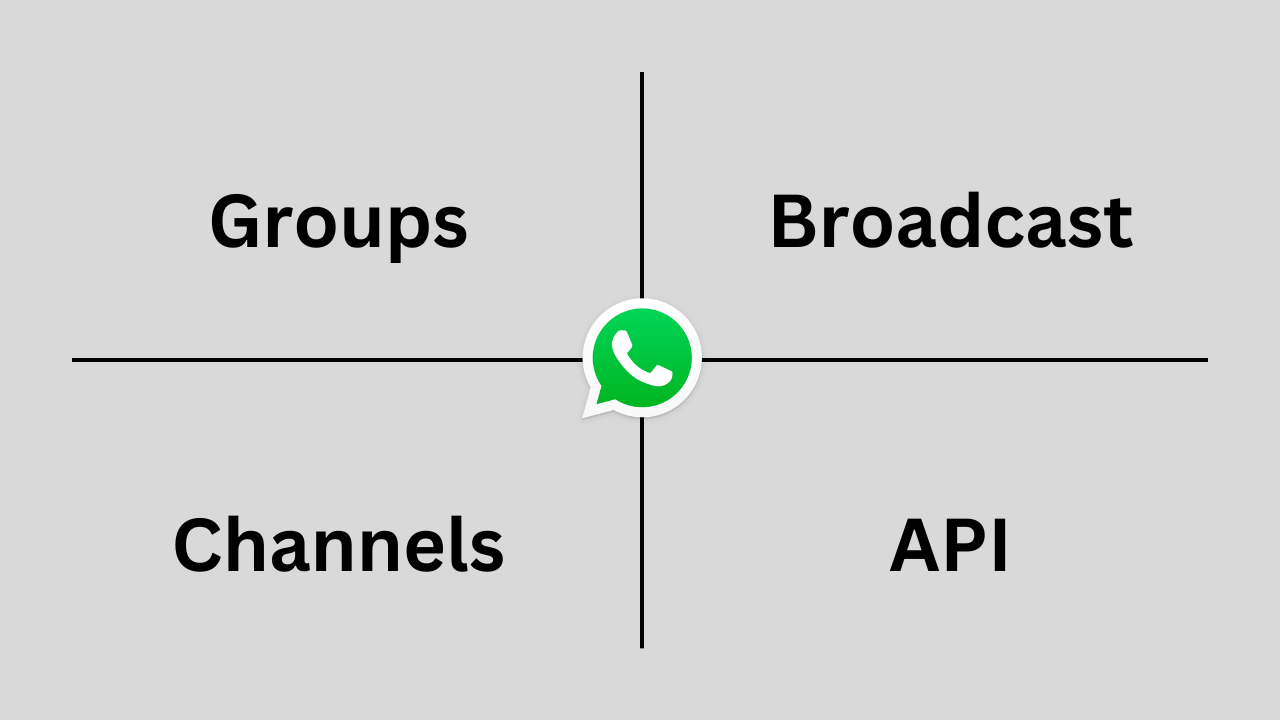WhatsApp Groups, Channels, Broadcast Lists, API are tools that may look similar, but each one has it is own particularities. In this table we compare each feature inside WhatsApp so you can understand what are the best options for your company. In general these tools aim to solve one of the most demanded features for WhatsApp that is Bulk Messaging. But each tool will have a different output.
View a video about this topic. Free WhatsApp tools for your school.
| WhatsApp Groups | WhatsApp Broadcast List | WhatsApp Channel | WhatsApp API | |
| Cost | Free | Free | Free | Paid |
| Onboarding | The user choose to join / leave the group | The reach the user he/she needs to have you as a contact | The user choose to join / leave the group | You can contact any user if you have his / her phone number |
| Privacy | Users see each other and the conversation is shared with everyone | You send a message to each user and the conversation become a 1-1 | Users do not see each other and there are only reactions | You send a message to each user personalized and with variables and the conversation become a 1-1 |
| Interaction | Complete and shared. Everyone can chat with everyone else. | 1-1 | Only reactions | 1-1 / automated |
| Use case | Everyone is a colleague / friend. Privacy is not an issue | Client list. But if they do not have as a contact, you will not reach their inbox. The message is the same for everyone. | From your company / brand to the user. Is very similar to the news feed. | From your company to your client list. Push notifications and reminders. You can customise each message with variables. |
| Bulk messaging | Yes | Yes | Yes | Yes |
| Pros | Everyone can talk to each other | Feels like a 1-1 message | Private and one to many | Personalized and actionable messages |
| Cons | Everyone can see each other | If the recipient do not have you as a contact, your message will not reach him / her | No interaction. Only reactions.It is not part of the inbox. | Pay per use |
Download this table / document.
What are the steps to send a bulk campaign? Read this article.
Compare and use cases for WhatsApp Groups, Broadcast lists, WhatsApp Channels and WhatsApp API
Let’s compare WhatsApp Groups, Broadcast Lists, WhatsApp Channels, and WhatsApp API based on their functionalities and use cases:

WhatsApp Groups
- Functionality: WhatsApp groups are interactive forums where multiple participants can communicate with each other in a group chat setting. Members can exchange messages, share multimedia content, and engage in discussions.
- Use Cases: WhatsApp groups are ideal for small to medium-sized groups, such as family members, friends, or work teams, who need to communicate and collaborate on various topics. They are commonly used for social gatherings, project management, community groups, and more.
- Features: WhatsApp groups support features such as group chats, multimedia sharing, group settings customization, admin controls, and moderation tools.
- The main “cons” for WhatsApp Groups is that each user will see each other in the members lists.

WhatsApp Broadcast Lists
- Functionality: WhatsApp broadcast lists allow users to send a single message to multiple recipients without creating a group chat. However, messages sent via broadcast lists are received as individual messages, and recipients cannot see each other’s responses.
- Use Cases: Broadcast lists are suitable for broadcasting announcements, updates, or promotions to a large audience while maintaining the privacy of recipients. They are commonly used for business communications, event notifications, and promotional messages.
- Features: Broadcast lists support one-way communication, allowing users to send messages to multiple recipients simultaneously. However, recipients cannot interact with each other or see each other’s responses.
- The main “cons” for Broadcast Lists is that only works if both users are a contact in your WhatsApp.

WhatsApp Channels
- Functionality: WhatsApp Channels, enable businesses to engage with customers on a larger scale. They allow businesses to send messages to users who have opted in to receive updates from the business.
- Use Cases: WhatsApp Channels are suitable for businesses and organizations that need to provide customer support, send transactional messages, deliver promotional content, or facilitate interactions with customers at scale.
- Features: WhatsApp Channels support one-to-many communication, allowing businesses to send messages to multiple users who have subscribed to receive updates from the business. They offer features such as message templates, automated responses, and integration with business systems.
- The main “cons” is that there is no interaction (only reactions) is not part of the inbox screen and the opt-in process is complex.

WhatsApp API
- Functionality: The WhatsApp API (Application Programming Interface) allows developers to integrate WhatsApp messaging capabilities into their own applications or systems. It provides access to WhatsApp’s messaging infrastructure and enables developers to build custom solutions for sending and receiving messages, managing contacts, and more.
- Use Cases: The WhatsApp API is used by businesses, developers, and organizations to create custom messaging solutions, automate workflows, integrate with existing systems, and enhance customer engagement.
- Features: The WhatsApp API offers a wide range of features, including message sending and receiving, multimedia support, message templates, user authentication, message encryption, and integration with third-party systems.
- The main “cons” is that is a paid solution and the verification process is very complex.
In summary, while WhatsApp Groups, Broadcast Lists, WhatsApp Channels, and WhatsApp API all offer messaging capabilities, they serve different purposes and cater to different use cases. WhatsApp Groups are ideal for group communication and collaboration, Broadcast Lists are suitable for broadcasting messages to a large audience, WhatsApp Channels are designed for business communication at scale, and WhatsApp API enables developers to build custom messaging solutions.
